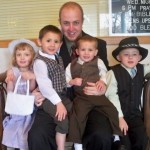Caryn
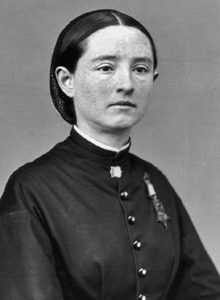 These days, we are all used to having a female doctor taking care of us. Those who haven’t are, nevertheless, not opposed to it. Others really don’t want a male doctor. It’s not a gender issue exactly, but there are women who just don’t feel comfortable with a male doctor, and men who don’t feel comfortable with a female doctor. We might have thought that this would not still be an issue all these years later, but it can be. As long as people are uncomfortable with their bodies, this might be the case.
These days, we are all used to having a female doctor taking care of us. Those who haven’t are, nevertheless, not opposed to it. Others really don’t want a male doctor. It’s not a gender issue exactly, but there are women who just don’t feel comfortable with a male doctor, and men who don’t feel comfortable with a female doctor. We might have thought that this would not still be an issue all these years later, but it can be. As long as people are uncomfortable with their bodies, this might be the case.
In the 1800s, however, this was not just an issue of discomfort, it was just not done. Mary E Walker was born in 1832, in Oswego Town near Oswego, New York. She was never one, to “hide her light,” but rather always stood out in a crowd. Even as a child, she was distinguished for her strength of mind and her decision of character. She grew into a very independent woman. Mary wanted to be useful. She had no desire to sit at home and be “just a housewife.” Mary was a feminist before most people knew what that was. She always had great energy, and in her early years, she wore bloomers, the pantaloon style garb of the radical feminists of the age. She decided to go to medical school, and when she graduated in 1855, she was the only female in her class from Syracuse Medical College. After graduation, she became one of the few women physicians in the country.
When the Civil War began in 1861, Dr Walker, who was 29 years old by then, journeyed to Washington DC and applied for an appointment as an Army surgeon. Of course, the Medical Department was…shocked, to put it mildly, and they quickly rejected her…with considerable verbosity. “A woman’s place is in the home,” or “No one will go to a woman doctor!” Dr Walker was not a woman who could be so easily discouraged. She stayed in Washington, and even served as an unpaid volunteer in various camps. Who would do that, and how did she survive without pay. Then, when the patent office was converted into a hospital, Walker served as assistant surgeon…again, without pay. During her time in the patent-office-turned-hospital, she was instrumental in establishing an organization that aided needy women who came to Washington to visit wounded relatives. It was a need that no one really thought about until she did, and it was probably reminiscent on the modern-day Ronald McDonald House.
As good as she was, Walker was not immune to considerable amounts of abuse over her persistent demands to be made a surgeon. Still, they could not dispute the fact that she also earned considerable respect for her many good works. It was about this time that she decided to abandon the bloomers and adopt a modified version of male attire, with a calf length skirt worn over trousers. She kept her hair relatively long and curled 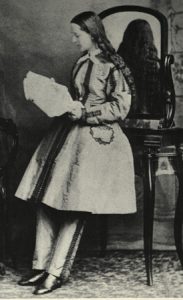 so that anyone could know she was a woman. While she wore a modified version of men’s clothes, she wanted everyone to know that she was a woman. She would not mask her talents by pretending to be a man.
so that anyone could know she was a woman. While she wore a modified version of men’s clothes, she wanted everyone to know that she was a woman. She would not mask her talents by pretending to be a man.
Finally, in November 1862, Dr Mary E Walker presented herself at the Virginia headquarters of MG Ambrose Burnside, and was taken on as a field surgeon. She was still a volunteer, but she was a titled surgeon. She treated the wounded at Warrenton and in Fredericksburg in December 1862. Almost a year later, she was in Chattanooga, Tennessee, tending the casualties of the battle of Chickamauga. After the battle, she again requested a commission as an Army doctor, such a simple thing after her years of loyal service, I would think. In September 1863, MG George H Thomas appointed her as an assistant surgeon in the Army of the Cumberland, assigning her to the 52nd Ohio Regiment. Finally, she had her commission. Now, many stories were told of her bravery under fire. Suddenly, it was ok to talk about just how incredible she was.
Sadly, she served with the 52nd Ohio Regiment for only a short time. In April 1864, Walker was captured by Confederate troops. She had stayed behind to tend wounded following a Union retirement. The Confederates charged her with being a spy and arrested her. The spy accusation came about as a result of her male attire. They said it constituted the principal evidence against her. Dr Walker spent the next four months in various prisons, being subjected to much abuse for her “unladylike” occupation and attire, until she was exchanged for a Confederate surgeon in August 1864.
In October of the same year, the Medical Department granted Dr Walker a contract as an acting assistant surgeon. Finally, 3 years after she first showed up on their doorstep she was given the rank and pay she deserved. Still, despite her requests for battlefield duty, she was not sent into the field again. She spent the rest of the war as superintendent at a Louisville, Kentucky, female prison hospital and a Clarksville, Tennessee orphanage. After she was released from her government contract at the end of the war, Walker lobbied for a brevet promotion to major for her services. Typically, Secretary of War Stanton would not grant the request. Finally, President Andrew Johnson asked for another way to recognize her service. A Medal of Honor was presented to Dr Walker in January 1866. She wore it every day for the rest of her life. She continued in the women’s rights movement and also crusaded against immorality, alcohol and tobacco, and for clothing and election reform. One of her more unusual positions was that there was no need for a women’s suffrage act, as women already had the vote as American citizens. Her taste in clothes never changed, and caused her frequent arrests on such charges as impersonating a man. At one trial, she asserted her right to, “Dress as I please in free America on whose tented fields I have served for four years in the cause of human freedom.” The judge 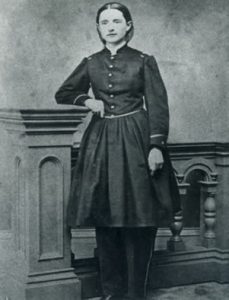 dismissed the case and ordered the police never to arrest Dr Walker on that charge again. She left the courtroom to hearty applause.
dismissed the case and ordered the police never to arrest Dr Walker on that charge again. She left the courtroom to hearty applause.
In 1916, Congress revised the Medal of Honor standards to include only actual combat with an enemy. Several months later, in 1917, the Board of Medal Awards, after reviewing the merits of the awardees of the Civil War awards, ruled Dr Walker’s medal, as well as those of 910 other recipients, as unwarranted and revoked them. It was an insult of the highest degree, and even after her death on February 21, 1919 at the age of 86, it was not to be forgotten. Nearly 60 years after her death, one of her descendants urged the Army Board for Correction of Military Records to review the case. On June 19, 1977, Army Secretary Clifford Alexander approved the recommendation to restore the Medal of Honor to Dr Mary E Walker. It was the right thing to do. Walker remains the sole female recipient of the Medal of Honor.
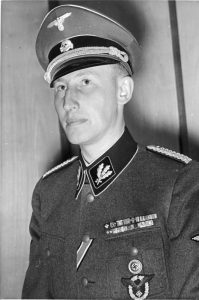 During the evil reign of the Nazi regime, we saw leaders of occupied nations being replaced by a Nazi official, who was in agreement with Hitler on the way things should be run. The deposed leader was then exiled, or worse yet, murdered. In September 1941, Reinhard Heydrich, a high-ranking Nazi official and a primary architect of the holocaust, was named Reich Protector of Bohemia and Moravia (formerly Czechoslovakia). He wasted no time in declaring martial law, and then began executing political prisoners and intelligentsia, and deported the sizable Czech Jewish community. During this time, the Czech government had been exiled to London, but they could not stand what was happening to their countrymen, so they decided to assassinate Heydrich…and so, Operation Anthropoid was born.
During the evil reign of the Nazi regime, we saw leaders of occupied nations being replaced by a Nazi official, who was in agreement with Hitler on the way things should be run. The deposed leader was then exiled, or worse yet, murdered. In September 1941, Reinhard Heydrich, a high-ranking Nazi official and a primary architect of the holocaust, was named Reich Protector of Bohemia and Moravia (formerly Czechoslovakia). He wasted no time in declaring martial law, and then began executing political prisoners and intelligentsia, and deported the sizable Czech Jewish community. During this time, the Czech government had been exiled to London, but they could not stand what was happening to their countrymen, so they decided to assassinate Heydrich…and so, Operation Anthropoid was born.
Two Czech agents, Jan Kubis and Josef Gabcik, had undergone extensive training by British intelligence, and on December 29, 1941, were successfully parachuted into Czechoslovakia. Once on the ground, they had to establish themselves, so they spent six months perfecting a plan with local resistance fighters, who were more 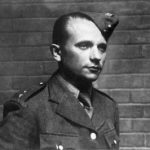
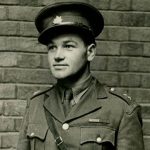 than happy to lend a hand in such an important mission. The plan was perfect. The Reich Protector didn’t think he had anything to fear from the local citizens, whom he assumed were beaten down and obedient. On May 27, 1942, Kubis and Gabcik secretly waited along Heydrich’s usual morning route to the Nazi’s Prague headquarters. Reich Protector Heydrich was an arrogant man, and he boldly rode in an open Mercedes convertible, thinking himself invincible, or at the very least well protected.
than happy to lend a hand in such an important mission. The plan was perfect. The Reich Protector didn’t think he had anything to fear from the local citizens, whom he assumed were beaten down and obedient. On May 27, 1942, Kubis and Gabcik secretly waited along Heydrich’s usual morning route to the Nazi’s Prague headquarters. Reich Protector Heydrich was an arrogant man, and he boldly rode in an open Mercedes convertible, thinking himself invincible, or at the very least well protected.
In an unfortunate turn of events, the machine gun Gabcik pointed at Heydrich, as his vehicle slowed at an L-shaped curve, misfired. Heydrich ordered his driver to stop, planning to shoot Gabcik, but Kubis tossed a 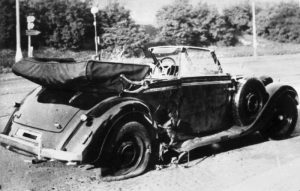 grenade and the Reich Protector’s car, which detonated near the car’s right fender. Both Kubis and Gabcik escaped and Heydrich, who initially thought he was uninjured, died on June 4, 1942. So, in the end the assassination was successful, if not strangely carried out. Unfortunately, not all resistance members are loyal, some can be bought off, and that is what happened in this case. Kubis and Gabcik were betrayed by a resistance member and died heroically, on June 18, 1942, after a gunfight with the Gestapo at a Prague church. While these men ultimately gave their lives for this cause, they were heroes, because the target, Reich Protector Heydrich was assassinated, and that was vital.
grenade and the Reich Protector’s car, which detonated near the car’s right fender. Both Kubis and Gabcik escaped and Heydrich, who initially thought he was uninjured, died on June 4, 1942. So, in the end the assassination was successful, if not strangely carried out. Unfortunately, not all resistance members are loyal, some can be bought off, and that is what happened in this case. Kubis and Gabcik were betrayed by a resistance member and died heroically, on June 18, 1942, after a gunfight with the Gestapo at a Prague church. While these men ultimately gave their lives for this cause, they were heroes, because the target, Reich Protector Heydrich was assassinated, and that was vital.
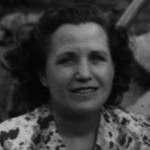 After a number of years of wondering what happened after the writing of my Aunt Bertha Schumacher Hallgren’s journals, or my reading of them…I have wondered about so many things. Bertha’s journal was so detailed and so interesting, but it left me feeling a little bit “at loose ends” about the lives of my aunt, and the Carl and Albertine Schumacher family, of which I am a part. I knew some things of course, like the fact that my Aunt Bertha had breast cancer, and that Aunt Mina had rheumatoid arthritis, as did her mom, my great grandma, Albertine Schumacher, and her siblings, my grandma, Anna Spencer and my Uncle Fred Schumacher. It left me wondering why it is that so often our lives come down to what illness we might have had? And then Aunt Bertha answers the question I had, when she said, “Only deep impressions are held in the conscious mind…ever present, while the sub-conscious may retain all experiences.” I suppose that our lives are marked by events, but surely there must be things that are more important that what disease a person had. Nevertheless, Aunt Bertha was “in my opinion” and that of my family, an excellent writer. She told the human side of history, and not just the historical events. Without the human side, history can be very boring, but you put in the hopes,
After a number of years of wondering what happened after the writing of my Aunt Bertha Schumacher Hallgren’s journals, or my reading of them…I have wondered about so many things. Bertha’s journal was so detailed and so interesting, but it left me feeling a little bit “at loose ends” about the lives of my aunt, and the Carl and Albertine Schumacher family, of which I am a part. I knew some things of course, like the fact that my Aunt Bertha had breast cancer, and that Aunt Mina had rheumatoid arthritis, as did her mom, my great grandma, Albertine Schumacher, and her siblings, my grandma, Anna Spencer and my Uncle Fred Schumacher. It left me wondering why it is that so often our lives come down to what illness we might have had? And then Aunt Bertha answers the question I had, when she said, “Only deep impressions are held in the conscious mind…ever present, while the sub-conscious may retain all experiences.” I suppose that our lives are marked by events, but surely there must be things that are more important that what disease a person had. Nevertheless, Aunt Bertha was “in my opinion” and that of my family, an excellent writer. She told the human side of history, and not just the historical events. Without the human side, history can be very boring, but you put in the hopes, 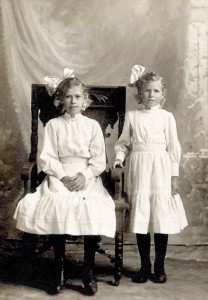 dreams, feelings, illnesses, and everyday lives of the people involved in the history being discussed. That is when history comes to life.
dreams, feelings, illnesses, and everyday lives of the people involved in the history being discussed. That is when history comes to life.
My Aunt Bertha and her sister, my Aunt Elsa took care of their parents who were ill, and in doing so, they gave up the chance to have a family of their own. They “adopted” their sister, Mina’s children as a replacement for children of their own. They both assumed that marriage was also one of those things they would have to give up, but in their latter years, both were given back that part of their lives, when they met and married their husbands, Arthur (Bertha) Hallgren and Frank (Elsa) Lawrence. Unfortunately, neither marriage lasted long, with Elsa’s ending in Frank’s death after 6 years, and Bertha’s ending in Arthur’s death after 2½ years.
Aunt Bertha fretted some when Elsa got married, not because Elsa was getting married. Bertha was happy for her, but she and Elsa had lived together all their lives to that point…42 years in all. Bertha said that it felt like a divorce…dividing up the household, “you take this and I’ll take that.” Bertha had never lived alone before. I’m sure she felt lonely…even before Elsa left. Then, after Elsa returned home when her husband passed away, when Bertha was ill, she worried about how Elsa would do when she was gone. Bertha was really very protective of her little sister, who had never lived alone. In the end, Elsa would live 17 years beyond Bertha’s life. She was ok, but I know she  missed Bertha terribly.
missed Bertha terribly.
I knew that my great grandparents were Christians, and had raised their children as Christians, and that teaching came down through the generations. Nevertheless, I was very moved by the way my aunt expressed her faith and trust in God. She knew that her life would not have been nearly as blessed as it was, if it had been lived without God in her life. I don’t know why it seems new to me, but I guess it’s because people don’t often talk about their faith, here she was, telling about the deep relationship with God. It was very moving, and sweet. Bertha was a woman who had been single for all but 2½ years of her life. She learned to depend on God…to trust Him. She loved her Lord, and I love that.
 War is inevitable, it would seem. One nation does something another nation doesn’t like, and before you know it, one is attacking the other. War is a bloody business…most of the time. However, in the case of the war between the Netherlands and the Isles of Sicily, that isn’t what happened. The war was strange in every way, and even started in a strange way. The English Civil War, which was fought between the Royalists and Parliamentarians raged from 1642 to 1651. In that war, Oliver Cromwell, who was born into the middle gentry to a family descended from the sister of Henry VIII’s minister Thomas Cromwell, was instrumental in the outcome. He became an Independent Puritan after undergoing a religious conversion in the 1630s. Cromwell generally agreed with the many Protestant churches of that time period. He was an intensely religious man, and he fervently believed that God was guiding his victories. He was elected Member of Parliament for Huntingdon in 1628 and for Cambridge in the Short (1640) and Long (1640–1649) Parliaments. Cromwell had very specific political beliefs, and when he entered the English Civil Wars, it was on the side of the “Roundheads” or Parliamentarians, nicknamed “Old Ironsides.” He demonstrated his
War is inevitable, it would seem. One nation does something another nation doesn’t like, and before you know it, one is attacking the other. War is a bloody business…most of the time. However, in the case of the war between the Netherlands and the Isles of Sicily, that isn’t what happened. The war was strange in every way, and even started in a strange way. The English Civil War, which was fought between the Royalists and Parliamentarians raged from 1642 to 1651. In that war, Oliver Cromwell, who was born into the middle gentry to a family descended from the sister of Henry VIII’s minister Thomas Cromwell, was instrumental in the outcome. He became an Independent Puritan after undergoing a religious conversion in the 1630s. Cromwell generally agreed with the many Protestant churches of that time period. He was an intensely religious man, and he fervently believed that God was guiding his victories. He was elected Member of Parliament for Huntingdon in 1628 and for Cambridge in the Short (1640) and Long (1640–1649) Parliaments. Cromwell had very specific political beliefs, and when he entered the English Civil Wars, it was on the side of the “Roundheads” or Parliamentarians, nicknamed “Old Ironsides.” He demonstrated his  ability as a commander and was quickly promoted from leading a single cavalry troop to being one of the principal commanders of the New Model Army, playing an important role under General Sir Thomas Fairfax in the defeat of the Royalist or “Cavalier” forces.
ability as a commander and was quickly promoted from leading a single cavalry troop to being one of the principal commanders of the New Model Army, playing an important role under General Sir Thomas Fairfax in the defeat of the Royalist or “Cavalier” forces.
Cromwell fought the Royalists to the edges of the Kingdom of England. In the West of England this meant that Cornwall was the last Royalist stronghold. In 1648, Cromwell pushed on until mainland Cornwall was in the hands of the Parliamentarians. The Royalist Navy was forced to retreat to the Isles of Sicily, which lay off the Cornish coast and were under the ownership of Royalist John Granville. With the Royalists on the Isles of Sicily, and the Parliamentarians in England, the war ended…at least the English Civil War ended. Immediately thereafter…on March 30, 1651, one of history’s longest wars began, between the Netherlands and the Isles of Sicily. It lasted for 335 years and was filled with bitter hatred. Still, not a single person was killed. What kind of war is that? The war that comes closest to what this was, would be  the Cold War. It was called, The Three Hundred and Thirty Five Years’ War and many will dispute its existence. It is thought that the “war” ended long before it was officially listed as over, and that the only thing that wasn’t done was to sign a peace treaty, and that one thing extended the war for 335 years without a single shot being fired. That fact made it one of the world’s longest wars, and also a bloodless war. The big problem with the validity of the war was that there was no specific declaration of war. Because of that, no one knew if they needed to negotiate a peace treaty or not. Nevertheless, because they needed to end this war, and because the declaration of a state of war was not officially know to exist, peace was finally declared on April 17, 1987, bringing an end to any hypothetical war that may have been legally considered to exist.
the Cold War. It was called, The Three Hundred and Thirty Five Years’ War and many will dispute its existence. It is thought that the “war” ended long before it was officially listed as over, and that the only thing that wasn’t done was to sign a peace treaty, and that one thing extended the war for 335 years without a single shot being fired. That fact made it one of the world’s longest wars, and also a bloodless war. The big problem with the validity of the war was that there was no specific declaration of war. Because of that, no one knew if they needed to negotiate a peace treaty or not. Nevertheless, because they needed to end this war, and because the declaration of a state of war was not officially know to exist, peace was finally declared on April 17, 1987, bringing an end to any hypothetical war that may have been legally considered to exist.

 My grand nephew, James Renville got the “travel bug” early on in his life. The first trip he took was when he was just when he was just 3 weeks old. His parents, my niece Toni Chase and her then husband, Jim Renville to their newborn son to meet his grandpa in North Dakota. Many babies don’t do well on long trips, but James was calm throughout the seven hour drive. He was such a good baby for them. The only times he fussed was when he was hungry, and then it wasn’t much fussing. Really, from that point on, James was at his most calm when he was traveling. His mom says that he “knew what vacation meant from the start.”
My grand nephew, James Renville got the “travel bug” early on in his life. The first trip he took was when he was just when he was just 3 weeks old. His parents, my niece Toni Chase and her then husband, Jim Renville to their newborn son to meet his grandpa in North Dakota. Many babies don’t do well on long trips, but James was calm throughout the seven hour drive. He was such a good baby for them. The only times he fussed was when he was hungry, and then it wasn’t much fussing. Really, from that point on, James was at his most calm when he was traveling. His mom says that he “knew what vacation meant from the start.”
Toni read somewhere, and many of us have always thought the same thing, that when you are an “only child,” like James is, that “you are likely to mature early and manifest adult behaviors an attitudes.” I’m sure it is because they around adults so much. That was never made more clear to her than when they went on the first trip that James was old enough to really know what was going on. They took James to the water park in South Dakota. He really had a blast, but he refused to go on any of the “kiddie slides” or “baby slides,” as he called them. While that was great for James, it meant that since James really was a “kiddie” or “baby” himself, he also couldn’t go on the big slides without an adult. So, his mom and dad had to go up and down the steep hills, carrying James most of the way, in the 90° heat to get to the slides. The plan had been to let the kids…James and his cousins…play for a while, and then head home in the afternoon. Well, when everyone else was ready to go…the cousins had already fallen asleep, James definitely was not. He wasn’t one bit tired, or as his mom puts it, “Not even a yawn!” They ended up staying until the park closed.
Last August, James took a trip with some friends of his. It was a chance to say goodbye to summer, and to one friend who was leaving to start his career in the Air Force. For James, it was also a way to “say goodbye” to 
 being a kid. College was over, and everything was going to be different now. The friends went to Denver to cut loose a little bit. They went to Eliches, went clubbing, and checked out some of the breweries. Toni began to think of what was coming next. She wanted things to be good for James, and he did love to travel. He had taken tips to the Netherlands and Spain, and she wanted to do something fun for him.
being a kid. College was over, and everything was going to be different now. The friends went to Denver to cut loose a little bit. They went to Eliches, went clubbing, and checked out some of the breweries. Toni began to think of what was coming next. She wanted things to be good for James, and he did love to travel. He had taken tips to the Netherlands and Spain, and she wanted to do something fun for him.
Toni and her husband, Dave Chase began to plan their own travels and some trips for James too. Things started off really well. Toni and Dave took him to a concert at Red Rocks in Denver. It was to be the first of several fun trips the family would take, including a trip to San Diego with Toni and Dave. The San Diego trip was amazing too. They spent 5 days there. They planned activities for every day. They went to an air show that Toni is sure James only went to “for her.” Then afterward, James said it wasn’t what he had expected. He said he had a great time. Then they went to a festival in La Jolla, several beaches on the ocean, the Cabrillo National Monument and the surrounding area, and the brewery district in the San Diego area…then relaxed at the resort.
After these trips, the Covid-19 Pandemic hit, and the whole world went into turmoil. For James that meant no trip to Las Vegas with his dad, Jim and the rest of their pool team for his first pool tournament, and trip that was to be the “Shangri La” of them all, James’ long awaited trip to the western coast of South America. He had planned to take that one last year, but couldn’t get the time off from his job. Now, it is all on hold, until the trips can be rearranged, and who knows how long that will be. Still, James really was born with the “traveling bug” and he has been building his skills for years. He is very driven and never wants to miss a thing. His past trips have included the Rocky Mountain Region (Wyoming, Montana, Utah, South Dakota, North Dakota, and 
 Colorado), the deserts of Nevada, the lakes of Arizona, the beaches of Florida, the ocean surrounding California, the eastern shores of Virginia and Washington DC, the costal plains of Alabama, the French Quarter of New Orleans nd Louisiana, the Ozark Mountains of Arkansas, and far beyond the northern hemisphere to see parts of the Netherlands and Spain. While some of his trips were cancelled or postponed this year, there is always next year. For James…well, next up is Peru, and it will be amazing!! Today is James’ birthday. Happy birthday James!! Have a great day!! We love you!!
Colorado), the deserts of Nevada, the lakes of Arizona, the beaches of Florida, the ocean surrounding California, the eastern shores of Virginia and Washington DC, the costal plains of Alabama, the French Quarter of New Orleans nd Louisiana, the Ozark Mountains of Arkansas, and far beyond the northern hemisphere to see parts of the Netherlands and Spain. While some of his trips were cancelled or postponed this year, there is always next year. For James…well, next up is Peru, and it will be amazing!! Today is James’ birthday. Happy birthday James!! Have a great day!! We love you!!
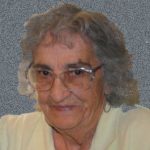
 Just under seven months ago, my Aunt Virginia Beadle left us to go to Heaven. Whenever I think of her, I picture her sweet face, always smiling gently at me. She never said a harsh word to me or anyone else I know of either. Oh I suppose she did get angry or speak harshly at some point in her life, but not in her latter years…not that I know of. Aunt Virginia just always had a sweet disposition.
Just under seven months ago, my Aunt Virginia Beadle left us to go to Heaven. Whenever I think of her, I picture her sweet face, always smiling gently at me. She never said a harsh word to me or anyone else I know of either. Oh I suppose she did get angry or speak harshly at some point in her life, but not in her latter years…not that I know of. Aunt Virginia just always had a sweet disposition.
Aunt Virginia’s heart was with her family. She loved each of them dearly. Aunt Virginia had 5 children,  one of whom, Christy passed away shortly after her birth in 1967; and one, Forrest, born in 1956, whom she adopted as a baby. Forrest passed away in 2005. Her other children were Stephen, born in 1962; Betsy, born in 1965; and Billy, born in 1969. She was very proud of all of her children, and loved them very much. Of course, with children, come the blessings of grandchildren and later, great grandchildren, and Aunt Virginia was very blessed in both of those areas too. She was also very blessed with some wonderful children-in-law, who took great care of her in her latter years. I am very proud of all of her family for the care they gave her. As a caregiver in the past, I know that while they never feel like a burden, taking care of a parent can be a very taxing task. You would never change a thing, but you find yourself very tired while you are working to care for a parent. Aunt Virginia was able to live mostly at the homes of her children in her latter years, and with the exception of a few short nursing home stays after an illness, she did not have to move into a nursing home permanently. As most of us know, that is something many people worry might
one of whom, Christy passed away shortly after her birth in 1967; and one, Forrest, born in 1956, whom she adopted as a baby. Forrest passed away in 2005. Her other children were Stephen, born in 1962; Betsy, born in 1965; and Billy, born in 1969. She was very proud of all of her children, and loved them very much. Of course, with children, come the blessings of grandchildren and later, great grandchildren, and Aunt Virginia was very blessed in both of those areas too. She was also very blessed with some wonderful children-in-law, who took great care of her in her latter years. I am very proud of all of her family for the care they gave her. As a caregiver in the past, I know that while they never feel like a burden, taking care of a parent can be a very taxing task. You would never change a thing, but you find yourself very tired while you are working to care for a parent. Aunt Virginia was able to live mostly at the homes of her children in her latter years, and with the exception of a few short nursing home stays after an illness, she did not have to move into a nursing home permanently. As most of us know, that is something many people worry might 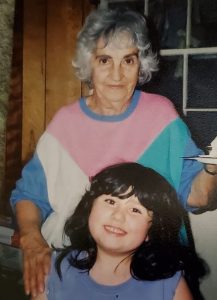
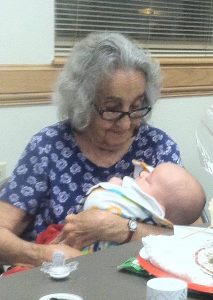 happen to them when they get older.
happen to them when they get older.
Aunt Virginia was always a tiny little woman, very petite, and at least in her latter years, rather short. I don’t know what her height was when she was younger, but the last times I saw her, I remember thinking that she was the size of a 10 or 12 year old child. Nevertheless, don’t let her size fool you. She could handle her own, at least before time took away her strength. Still, she was able to walk and take care of her own needs for the most part right up until her passing. I know that I will always have great love and respect for my dear Aunt Virginia. Today is Aunt Virginia’s 90th birthday and her first one in Heaven. Happy birthday in Heaven, Aunt Virginia. We love and miss you very much.

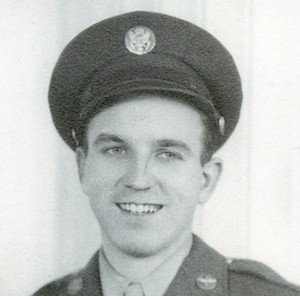 While listening to an audible book about World War II, called “Flak,” I heard one of the men being interviewed by the author for the book say, “History is told by the survivors.” It occurred to me that in most cases, at least in eras gone by, that was the truth. In order to know what really happened, there had to be a survivor. Even today, in an era of DNA, forensic science, black boxes, and phone video, there are events that cannot be definitively explained, and causes that remain a mystery.
While listening to an audible book about World War II, called “Flak,” I heard one of the men being interviewed by the author for the book say, “History is told by the survivors.” It occurred to me that in most cases, at least in eras gone by, that was the truth. In order to know what really happened, there had to be a survivor. Even today, in an era of DNA, forensic science, black boxes, and phone video, there are events that cannot be definitively explained, and causes that remain a mystery.
In World War II, survival was one of the main necessities to properly make an account of events. One might be able to look at pictures an know that the attack was bad, but in order to understand what it meant to fly through flak, someone had to really explain what the flak looked like up close, and tell us how hot it was when it got close enough to put a hole in the fuselage of the plane. We can imagine the fear the soldiers of World War II felt, but only because someone has “painted” a picture of just how bad it was to be pinned down in a foxhole with bombs raining down all around you, and bullets flying past if you tried to get out and run. No amount of 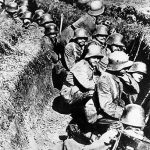 modern technology can explain how a soldier might have felt upon looking at his helmet to find a hole in it where shrapnel pierced it, and the soldier received only a small scratch. All of the “facts” that can be gleaned from the modern technology we have simply can’t tell us about how people felt.
modern technology can explain how a soldier might have felt upon looking at his helmet to find a hole in it where shrapnel pierced it, and the soldier received only a small scratch. All of the “facts” that can be gleaned from the modern technology we have simply can’t tell us about how people felt.
My dad, Allen Spencer was a top turret gunner in a B-17G bomber stationed in Great Ashfield. He told once about the ball turret gunner being shot up, and the desperate and futile effort to save his life. It was something Dad would never forget. The bombers that crashed taking all hands down with them, left no witnesses to tell if it was shot down or had engine trouble. If the plane could be found today, they might be able to guess at the cause of the crash, but it still might not be definitive. As to the soldiers who went missing in action, it was not uncommon for their body never to be found, and so no one could document their death, unless a buddy survived. All of the war stories we have today from World War II were told by the men, and women too, who survived. We know from the ones who witnessed the planes being shot down, blown up, or crashing with engine trouble. On the battlefield, the only witnesses were the other 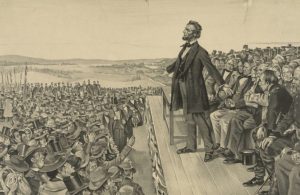 soldiers in the area, because the civilians had run far from the area.
soldiers in the area, because the civilians had run far from the area.
Even the non-war events of history had to have a “survivor” to tell about the event. It may not have been a violent event, but the Gettysburg Address would never have been known to anyone, if it had been spoken aloud in President Lincoln’s study with no one present. The speech might have been found later, but the depth of it’s meaning might have been completely lost had one witness not been so deeply moved by the speech. I wonder how much history was lost because no one was there to see and then survive to tell about it. It’s something to think about.

 How could such a small island, sitting in the middle of the Mediterranean Sea, have such a large impact during World War II? Malta is only 95 square miles, the largest of the three islands that make up the Maltese archipelago, and it had a population of 433,082 in 2019, so imagine how small the population was during World War II. Nevertheless, the British Crown Colony of Malta was a strategic location and made a pivotal contribution to the air war in the Mediterranean during World War II. I don’t suppose they wanted to be in such a position, and considering the loss of civilian lives, 1,300 in all, they paid a dear price for the war effort.
How could such a small island, sitting in the middle of the Mediterranean Sea, have such a large impact during World War II? Malta is only 95 square miles, the largest of the three islands that make up the Maltese archipelago, and it had a population of 433,082 in 2019, so imagine how small the population was during World War II. Nevertheless, the British Crown Colony of Malta was a strategic location and made a pivotal contribution to the air war in the Mediterranean during World War II. I don’t suppose they wanted to be in such a position, and considering the loss of civilian lives, 1,300 in all, they paid a dear price for the war effort.
With the opening of a new front in North Africa in June 1940, came an increase to Malta’s already considerable value. There were British air and sea forces based on the island, who were able to attack the Axis ships transporting vital supplies and reinforcements from Europe. Winston Churchill called the island an “unsinkable 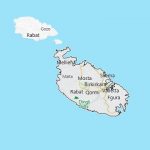
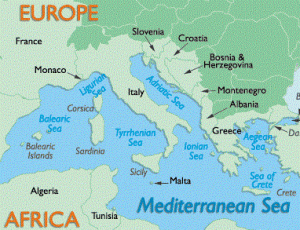
 aircraft carrier.” Of course, Malta was a lot bigger, but it was in the sea, and it did have an air base, so it was like a large aircraft carrier. Churchill’s analogy makes sense in that planes could be dispatched from there and return to there as needed during fighting. General Erwin Rommel, the field command of Axis forces in North Africa, recognized its importance quickly. In May 1941, he warned that “Without Malta the Axis will end by losing control of North Africa.”
aircraft carrier.” Of course, Malta was a lot bigger, but it was in the sea, and it did have an air base, so it was like a large aircraft carrier. Churchill’s analogy makes sense in that planes could be dispatched from there and return to there as needed during fighting. General Erwin Rommel, the field command of Axis forces in North Africa, recognized its importance quickly. In May 1941, he warned that “Without Malta the Axis will end by losing control of North Africa.”
Being a strategic centerpiece did not, guarantee Malta’s safety. In fact, the opposite was the case. Both sides needed Malta, but only the Allies had it, so the Axis nations decided to destroy it. Between 1940 and 1942, Malta faced relentless aerial attacks by the Luftwaffe and Italian Air Force. The Royal Navy and Royal Air Force both fought to defend the island and keep it supplied. Malta was essential to the Allied war effort to disrupt Axis 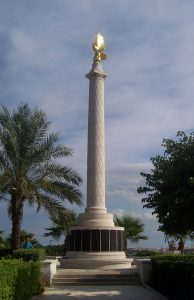
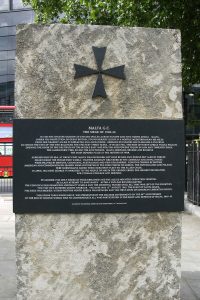 supply lines to Libya, and also for supplying British armies in Egypt. The German and Italian high commands also realized the danger of a British stronghold so close to Italy. Malta was a danger to the Axis nations, and they were bent on wiping it off the face of the earth. Malta had a target on it, and they began to feel like the shooting range.
supply lines to Libya, and also for supplying British armies in Egypt. The German and Italian high commands also realized the danger of a British stronghold so close to Italy. Malta was a danger to the Axis nations, and they were bent on wiping it off the face of the earth. Malta had a target on it, and they began to feel like the shooting range.
Through the course of the war, Malta was bombed so many times that in the end, that in April 1942, the people of Malta were collectively awarded the George Cross by King George VI, which is the highest award for civilian courage and heroism. It is the only time that an entire nation received such an honor. The award was considered such an honor that the nations flag proudly displays the George Cross.
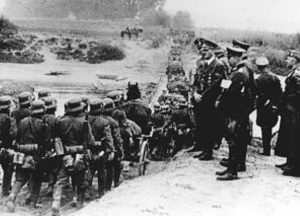 While Germany was not able to bring home the victory in World War II, they were a formidable enemy early in the war. On April 9, 1940, Nazi Germany launched an invasion into Norway. The initial attack was successful, and the Nazis captured several strategic points on the Norwegian coast. Hitler didn’t care that Norway had declared neutrality at the outbreak of World War II. Hitler wanted to rule the world and Norway was part of what he wanted.
While Germany was not able to bring home the victory in World War II, they were a formidable enemy early in the war. On April 9, 1940, Nazi Germany launched an invasion into Norway. The initial attack was successful, and the Nazis captured several strategic points on the Norwegian coast. Hitler didn’t care that Norway had declared neutrality at the outbreak of World War II. Hitler wanted to rule the world and Norway was part of what he wanted.
During the preliminary phase of the invasion, Norwegian fascist forces under Vidkun Quisling acted as a so-called “fifth column” for the German invaders, seizing Norway’s nerve centers, spreading false rumors, and occupying military bases and other locations. They were the invaders from within. 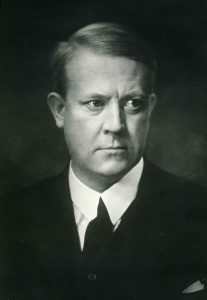 Quisling agreed with Hitler concerning the “Jewish problem” and became the leader of Norway during the Nazi occupation. Prior to that Quisling served as the Norwegian minister of defense from 1931 to 1933, and in 1934 he left the ruling party to establish the Nasjonal Samling, or National Unity Party, which was an imitation of Adolf Hitler’s Nazi Party.
Quisling agreed with Hitler concerning the “Jewish problem” and became the leader of Norway during the Nazi occupation. Prior to that Quisling served as the Norwegian minister of defense from 1931 to 1933, and in 1934 he left the ruling party to establish the Nasjonal Samling, or National Unity Party, which was an imitation of Adolf Hitler’s Nazi Party.
Norway’s declaration of neutrality didn’t do them much good when their own minister of defense was a traitor. Norway’s declared neutrality at the outbreak of World War II, was simply a small stumbling block in the plan Nazi Germany had. Hitler regarded the occupation of Norway a strategic and economic necessity. In the spring of 1940, Vidkun Quisling met with Nazi command in Berlin to plan the German conquest of his country. The Norwegian people have no warning on April 9th, when the combined German forces attacked, and by June 10th Hitler had conquered Norway and driven all Allied forces from the country.
Being the head of the only political party permitted by the Nazis didn’t do Quisling 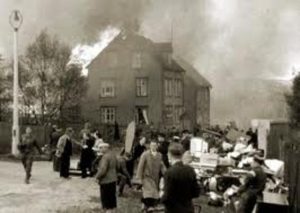 any good either. The people hated him, and opposition to him in Norway was so great that he couldn’t formally establish his puppet government in Oslo until February 1942. Nevertheless, the regime he set up under the authority of his Nazi commissioner, Josef Terboven, was a repressive regime that was merciless toward those who defied it. There was not peace for either side in those years. Norway’s resistance movement soon became the most effective in all Nazi-occupied Europe, and Quisling’s authority rapidly failed. After the German surrender in May 1945, Quisling was arrested, convicted of high treason, and shot. He was so hated that from his name comes the word quisling, meaning “traitor” in several languages.
any good either. The people hated him, and opposition to him in Norway was so great that he couldn’t formally establish his puppet government in Oslo until February 1942. Nevertheless, the regime he set up under the authority of his Nazi commissioner, Josef Terboven, was a repressive regime that was merciless toward those who defied it. There was not peace for either side in those years. Norway’s resistance movement soon became the most effective in all Nazi-occupied Europe, and Quisling’s authority rapidly failed. After the German surrender in May 1945, Quisling was arrested, convicted of high treason, and shot. He was so hated that from his name comes the word quisling, meaning “traitor” in several languages.
